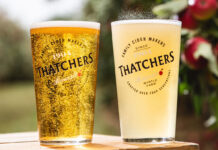A well-managed cellar underpins any good bar and ensures a great pint

IN 2018 appearances have become as important as ever in all aspects of the on-trade; but appearances can be deceptive and operators must ensure their business is built on solid foundations.
Part of that means making sure pubs and bars are underpinned by well-run cellars, even though customers will never see them.
And this summer was a particularly challenging one for licensees.
As temperatures soared for weeks on end, there’s little doubt that it put some strain on cellars, serving as an important reminder that they are the backbone of bars.
As the continued rise of craft beer and cask ale sees a bigger demand for drinks on draught, cellar experts told SLTN that licensees should always have their pubs’ cellar in mind.
“Good cellar management means you are looking after your beer and better beer means better business,” said Richard Cooper at beer line cleaning firm Clear Brew Glasgow North.
“There is no point cutting costs if it also impacts profits, and in this day and age nothing is going to lose you customers quicker than poor quality.
“Cost cutting is one of the main reasons for poor cellar management – out of sight, out of mind makes it easy to ignore issues in the cellar so long as beer is still being poured. This attitude can quickly lead to a very poor quality pint.
“Therefore, good cellar management practices and staff training should always be a priority.”
Dougie Stoddart, commercial director at Hubbard Products, reckons this summer’s weather proved that “it’s important never to underestimate the vagaries of the British climate” as being unprepared can have “serious consequences for a licensee’s profitability”.
He added: “Many have been caught out this year with higher ambient cellar temperatures leading, not unsurprisingly, to beer being served too warm.
“As cellar temperatures rise during the summer months so does the proportion of warm beer being dispensed. Fluctuations in the ambient temperature may result in beer being served outside the brewers’ recommendations and increases the chance of breakdown and maintenance problems.”
If there’s one golden rule when it comes to the cellar, it’s to keep the space between 11°C and 13°C at all times, protecting the beers and ales within from extreme weather conditions across all seasons, said firms.
“It’s equally important in the winter to maintain these temperatures as cask beer does not like temperatures dropping below 11°C as it has a detrimental effect on the beer,” said Stoddart of Hubbard Products.
“A constant temperature of 12°C, 24 hours a day, 365 days a year is critical.”
Jerry Shedden, category and trade marketing director at Heineken, agreed.
He said: “In pubs and large bars, the cellar should be kept at the right temperature – between 11°C and 13°C.
“Using the cellar as a general storage space is never a good idea and it is most certainly not the best place for the chest freezer, ice maker or fridge as they all add heat.”
In order to preserve beers and ales in the best possible condition, pubs were advised to have all bar staff trained competently on how to look after the cellar and impose a good routine and process that all staff must adhere to each day to ensure consistency.
Cooper at Clear Brew Glasgow North, said: “Staff with access to the cellar should be trained to understand your cellar management practices and why they are important.
“If you’re not communicating this, then you can’t expect your staff to understand the importance.”
Another important aspect that can’t be forgotten is safety, especially surrounding gas in the cellar, said a spokeswoman for Air Products.
She said: “Ensure all your gas equipment is correctly installed and regularly maintained. Know what gases you have and how to work with them safely.”























